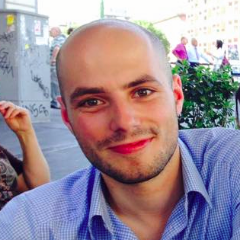As all eyes turned to Russia for the closing of the Sochi Olympics, commentaries abound alleging Russia's re-identification in opposition to the West. If such a process is in swing, it is of course nothing new - it was deep, nationalistic soul-searching in the 1850s onwards that provided the backdrop to Tchaikovsky's search for a distinctively Russian voice. Tonight, “La Verdi” drew together an all Tchaikovsky programme that explored the Russianness, and indeed un-Russianness, of the great composer.
The orchestra was joined by legendary Milanese conductor Aldo Ceccato who, for a man that had been celebrating his 80th birthday just two evenings earlier, possesses a remarkable vivacity. Ceccato is evidently not one to wait around, and as he bustled onto stage to a flurry of applause and birthday wishes, promptly readied the orchestra and launched a mesmerising rendition of the Romeo and Juliet Fantasy Overture.
The opening, rustic chords were beautifully placed, and out of this nascent intensity the Friar Laurence theme emerged. First an ominous entry from the double basses, then the cellos, then beautifully precise horns precipitated the unfurling of the poisonous flower with which Shakespeare's Friar Laurence portends the lovers' death with the words “Full soon the canker death eats up the plant”. The warring Montagues and Capulets blazed with crashing cymbals and blustering rhythms, and when we reached the love theme, violins decelerating as they reached the pinnacle, Ceccato released a yearning string melody that gushed and then flowed with mellifluous abandon.
This is music of distinct Russianness, where the harmonies are static and the melodies spin out over a vast number of bars. It is therefore of no surprise that Romeo and Juliet was written under the guidance of Balakirev, who along with Rimsky-Kosakov, Mussorgsky, Borodin and Cui (together "The Five"), strove for a Russian musical identity that was independent of that of the West. The Five embraced Romeo and Juliet whole-heartedly, reputedly asking Balakirev to play the piece at parties so often that he learnt to play it from memory.
But this is not to forget that Tchaikovsky's talent was nurtured at the Russian Musical Society, where the composer was steeped in the Western classical tradition. This last point was explored in tonight's performance of Suite no. 4,Mozartiana, in which Tchaikovsky recomposed four lesser known works of his beloved Mozart for the ears of a Russian audience. This skittish work contains stark contrasts, and whilst the first movement ducked and darted with puckish caprice, the second was infused with darker Russian hues, Mozart's chords projecting a kaleidoscope of colours. The third movement was orchestrated from Liszt's piano transcription of the Ave Verum corpus, and this is followed by a “Theme and Variation” in which violinist Luca Santaniello provided a masterclass in his birdsong-like solo.
All of this was borne out of the inspired conducting of the irrepressible Ceccato, whose economy of gesture produced a sound of outstanding malleability. A flick from his baton would prompt a flurry of notes, a twinkle in his eye causing the embers to redden. But the music was also invested with proportion and direction, and individual phrases were always part of the bigger picture. In this way, everything stayed firmly on the canvas and we were able to revel in the sharp contrasts in which Tchaikovsky paints.
If the first two works highlighted Russian and Western features in the composer's works, his Symphony no. 4 in F minor in the second half showed how Tchaikovsky combined them into a single structure. Western sonata form loosely underpins the work and rather than mingling themes or developing them, Tchaikovsky sets his material apart in distinct blocks like a picture of Mondrian.
A terrifying fanfare opened the symphony before giving way to a grimly meandering polonaise; this was followed by an altogether gentler waltz that rendered the Polish dance a distant memory with snowy plods on timpani. But the polonaise returned with redoubled intensity, and by alternating the two themes like this Tchaikovsky builds up to a searing white-heat.
When asked whether his Fourth Symphony featured a definite programme, Tchaikovsky responded that it was more “an unburdening of the soul in music”. If the work does feature a hero, then it is Tchaikovsky himself, and one could imagine him wandering in a bleak expanse in the melancholy Andantino second movement. The Tchaikovsky of the finale was altogether more sanguine as he delighted in the revelries of others. All of this the orchestra realised with intelligence and style, and for this maestro Ceccato must receive particular praise.


